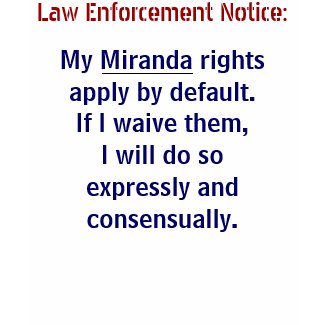The Berghuis decision inspires me to offer a new piece of legal armor—this time in the form of a t-shirt:
Click on the picture to buy a shirt, or borrow the text (I've uncopyrighted it) to make your own version from scratch. Combine that notice of your Miranda rights with the bumper sticker and magnetic sign I offered earlier, in defense of your rights to record and report what public officials do to you, and you might just dodge some serious legal hurt. Or—who knows?—you might inspire some interesting and important litigation.
I leave detailed analysis of how Berghuis jibes with Miranda and other precedents to other, more knowledgeable commentators (see supra, "ain't Prof. Crim Pro" disclaimer). I dare say, though, that Justice Sotomayor's dissent hit a nice note:
Today’s decision turns Miranda upside down. Criminal suspects must now unambiguously invoke their right to remain silent—which, counterintuitively, requires them to speak. At the same time, suspects will be legally presumed to have waived their rights even if they have given no clear expression of their intent to do so. Those results, in my view, find no basis in Miranda or our subsequent cases and are inconsistent with the fair-trial principles on which those precedents are grounded.Slip. op. at 23 (Sotomayor, J. dissenting).
I guess that you could say the Berghuis majority took a cue from the (so-called) libertarian paternalists and engaged in some legal nudging. In this case, however, the Court nudged our defaults away from individual liberty and toward prosecutorial power. Call it statist paternalism.
Thanks, Supremes, for giving us worse than nothing. Ah, well. As I read Berghuis, even the justices in the majority would not deny us the opportunity to answer their new default with a firm "No!" Thus might we recover our Constitutional rights with a t-shirt.
[Crossposted at Agoraphilia and The Technology Liberation Front.]

3 comments:
Prof. Bell,
with all due and considerable respect (and appreciation for the disclaimers), I believe you misunderstand the case.
Contrary to popular impression, it was not about somebody being punished (either legally or by police abuse) for choosing to remain silent after somehow implicitly waiving that right. If it had been, the case would have been very different and likely would never have reached the Supreme Court. And if it had and the Supreme Court ruled against the defendant, I'd share your outrage and order one of those shirts myself.
Of course that is not what happened. The defendant did choose to talk and eventually incriminated himself voluntarily. If he hadn't, there would have been no argument about whether his statements should have been suppressed.
The case was about a much narrower right of much less certain constitutional provenance: The right not to be asked questions by the police, even in a non-threatening, non-coercive manner.
The recent decision just held that this is a right which you have to invoke by expressly asking for counsel. Until you do, or if you just start talking afterwards, the police can ask you questions. And if you choose to say something, it can be used against you in court, just like the Miranda warning you just got says. Is that such a crazy rule?
So, even if the defendant had worn that shirt, once he started talking a court likely (and I think rightly) would rule that he had overridden that personal background rule by choosing to talk.
Now if the T-shirt said something like "I invoke my right to counsel and decline to make any statement until then," the story might have been different.
But are you sure you want to wear such a shirt? It could turn a simple traffic stop, which ordinarily might be resolved within a few minutes with or without a ticket, into a custodial ordeal lasting several hours.
In short, much as your critique of Nudge et al. is appreciated, I'm not sure that this Court decision is the right target for it.
I suspect that people who wear this shirt will be constantly reminded to remain silent (by everybody, not law enforcement).
I was thinking about adding a section that said something like "If I am not being detained, please let me know by telling me that I'm free to leave." But, that would suffer from a similar problem.
Aet: Thanks, but I don't agree with your take. The case was not simply about the right of the police to question. It was about the admissability of evidence obtained after many hours or high-pressure questioning, in the face of a subject's evident unwillingness to speak, and in the absence of any express waiver of Miranda rights.
Gil:I'll have to let you know how that turns out, once I take mine out for spin.
Post a Comment